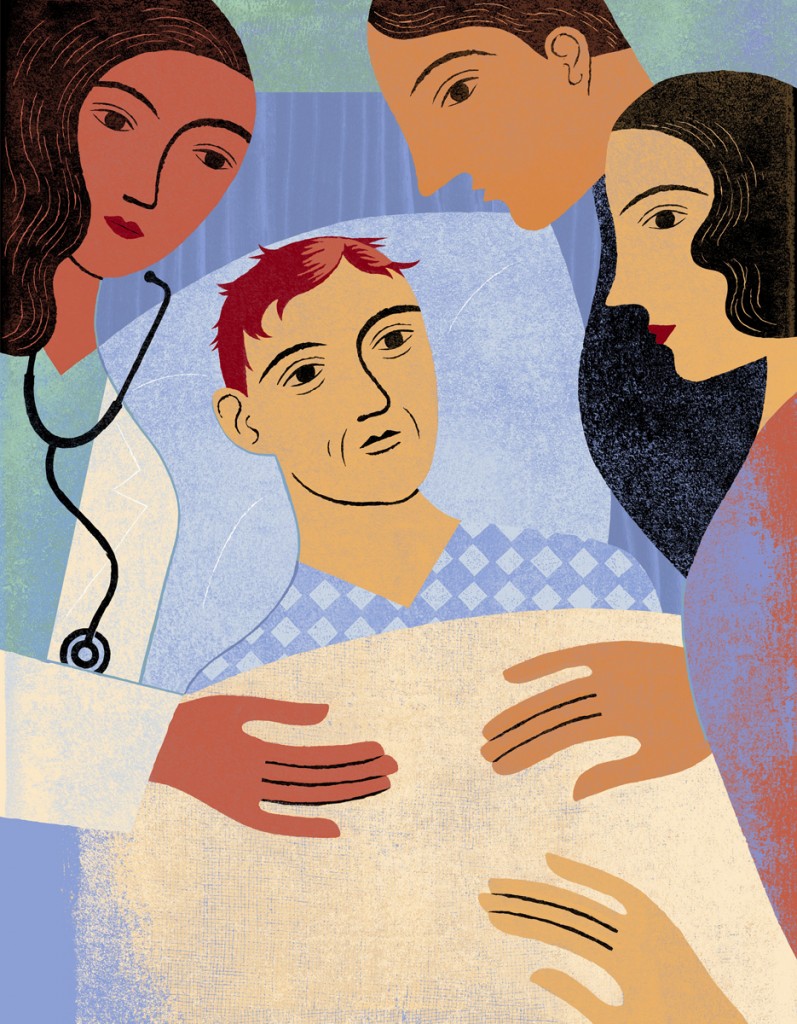Researchers from Harvard Medical School soon will begin testing a checklist-style approach to helping cancer patients get the kind of end-of-life care they want. The plans, detailed in June at a meeting of the International Society of Advance Care Planning and End of Life Care, are aimed at helping oncologists discuss end-of-life care issues with patients at an earlier stage in the disease process.
 The trial of the serious illness communication checklist will involve 60 practicing oncologists and begin enrolling 450 patients in June. Data on patient and family satisfaction and treatment choices will be collected over three years, researchers said.
The trial of the serious illness communication checklist will involve 60 practicing oncologists and begin enrolling 450 patients in June. Data on patient and family satisfaction and treatment choices will be collected over three years, researchers said.
A wide body of research has found that patients who plan ahead are likelier to get the treatments they want as they near death. These patients tend to get less-aggressive care, earlier referral to hospice, are more satisfied with their care and see lower burdens placed on family members, experts say. Yet fewer than one in three Americans has a living will, and only half of U.S. patients with terminal illnesses have such directives documented in their medical records, according to the Agency for Healthcare Research and Quality.
Nearly 90% of patients with cancer have documented end-of-life care discussions with their physicians, said a study of about 2,200 patients in Los Angeles and Toronto published in the Feb. 7 Annals of Internal Medicine (ncbi.nlm.nih.gov/pubmed/22312140/). But most of the talks happened in the hospital less than five weeks before death and were with physicians other than the patient’s oncologist.
“I always think about this idea that it’s too early until it’s too late,” said Susan D. Block, MD, principal investigator of the serious illness communication checklist study. “In medicine, in general, these conversations take place way too late. There are lots of excuses on everybody’s side about that, but it needs to change.”
Oncologists participating in the trial will undergo a 2½-hour training session on how to use the checklist. They can have nurse practitioners join them for the training and help carry out the conversations with patients, which can take 25 to 40 minutes. The checklist asks patients who are estimated to have less than a year to live to discuss:
Their understanding of the prognosis.
- How much information they want shared with loved ones.
- Their goals of care, should their health seriously worsen.
- Their biggest fears and what functional abilities they could not imagine living without.
- How much medical intervention they are willing to undergo to gain more time.
- How much they want family members to know about their priorities and wishes.
Talk focused on patient’s values
“We need to ask the right questions,” said Dr. Block, chair of the Dept. of Psychosocial Oncology and Palliative Care at Dana-Farber Cancer Institute in Boston. “Instead of focusing on procedures, we need to be focusing on goals, values, fears, quality of life, suffering and survival. Those are the things that matter to patients.”
The last step in the checklist is documentation, which integrates the patient’s answers — and any updates — into the electronic health record. The checklist has been piloted and fine-tuned during the last year, said Dr. Block, professor of psychiatry and medicine at Harvard Medical School. An abstract of her talk was published in the June issue of BMJ Supportive & Palliative Care (spcare.bmj.com/content/2/2/187.2.abstract).
Dr. Block was prompted to think about formulating the serious illness communication checklist by colleague Atul Gawande, MD, a professor of surgery at Harvard Medical School and author of The Checklist Manifesto: How to Get Things Right. Dr. Gawande, co-principal investigator of the study, had to overcome Dr. Block’s initial hesitation.
“I was very dubious,” she said in her presentation. “It seemed mechanical and reductionistic and cold to me, but I’ve warmed up to it. … I’m intrigued, in my mind, by this paradox — that something as routinized as a checklist could help with a conversation so deep and profound and complicated. It has some interesting potential, and we’re going to find out whether it works.”
Other presentations at the three-day conference focused on the challenges involved in advance care planning with racial and ethnic minorities, patients with disabilities and adolescents. Physicians, social workers, chaplains and other health professionals from Japan, Singapore, New Zealand, Australia and Canada presented information about end-of-life care planning initiatives in their countries.
Complete Article HERE!
